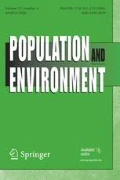Abstract
Debate over climate change focuses narrowly on the reduction of greenhouse gas emissions. A common justification for such emissions reductions is that they will lead to a reduction in the future impacts of climate on society. But research from social scientists and others who study environment–society interactions clearly indicates that the dominant factors shaping the impacts of climate on society are societal. A greater appreciation for this body of research would allow for consideration of a broader base of policy options to respond to the challenges of climate change, as well as the composition of climate research portfolios more likely to contribute useful knowledge to decision makers.
Similar content being viewed by others
References
R. Brunner (2001) ArticleTitleScience and the climate change regime Policy Sciences 34 IssueID1 1–33
R. Byerly SuffixJr. (1989) ArticleTitleThe policy dynamics of global change Earthquest 3 IssueID1 11–13
I. Goklany (2004) ArticleTitleClimate change and malaria Science 306 55–57
International Federation of Red Cross and Red Crescent Societies (IFRC), 2003.World Disasters Report, www.ifrc.org
Kabat, P., Claussen, M., Diremeyer, P. A., Gash, J. H. C., Deguenni, L. B., Meybeck, M., Pielke, Sr., R. A., Vörösmarty, C. J., Hutjes, R. W. A., & Lü tkemeier, S. (Eds.) (2003). Vegetation, Water, Humans and the Climate: A New Perspective on an Interactive System. Synthesis of the ICBP Core Project, Biospheric Aspects of the Hydrologic Cycle, Global Change, The IGBP Series, Springer, 650 pp.
D. King (2004) ArticleTitleClimate change and malaria Science 306 55–57
K. Kunkel R. A. Pielke SuffixJr. S. A. Changnon (1999) ArticleTitleTemporal fluctuations in weather and climate extremes that cause economic and human health impacts: A review Bulletin of the American Meteorological Society 80 IssueID6 1077–1098
Laird, F. (2001). Just say no to emissions reductions targets. Issues in Science and Technology, Winter
C. L. Landsea R. A. Pielke SuffixJr. A. Mestas-Nuñez J. Knaff (1999) ArticleTitleAtlantic basin hurricanes: Indicies of climate changes Climatic Change 42 89–129
R. J. Lempert E. Schlesinger (2000) ArticleTitleRobust strategies for abating climate change Climatic Change 45 IssueID3--4 387–401
Mileti, D. (1999). Disasters by Design. Joseph Henry Press.
Mileti, D. (2000). Second Assessment of Natural Hazards. Joseph Henry Press.
InstitutionalAuthorNameNRC (1999) Making Climate Forecasts Matter Paul C. Stern William E. Easterling (Eds) Panel on the Human Dimensions of Seasonal-to-Interannual Climate Variability; Committee on the Human Dimensions of Global Change National Academy Press National Research Council, Washington, DC
InstitutionalAuthorNameNRC (2003) Planning Climate and Global Change Research: A Review of the Draft U.S. Climate Change Science Program Strategic Plan National Academy Press National Research Council, Washington, DC 84
O’Brien, D. (2004). A storm over global warming: Some link temperature to ’04 hurricanes. The Seattle Times, 7 November.
OTA. (1993). Preparing for an Uncertain Climate, Office of Technology Assessment, United States Congress, Vol. 1, OTA-0–567
Pielke, R. A. Jr. (2004). What is climate change?, Issues in Science and Technology, Summer, 1–4
R. A. Pielke SuffixJr. M. W. Downton (2000) ArticleTitlePrecipitation and damaging floods: Trends in the United States, 1932–1997 Journal of Climate 13 3625–3637
R. A. Pielke SuffixJr. R. A. Klein D. Sarewitz (2000) ArticleTitleTurning the big knob: Energy Policy as a Means to Reduce Weather Impacts Energy and Environment 11 IssueID3 255–276
R. A. Pielke SuffixJr. C. W. Landsea (1998) ArticleTitleNormalized hurricane damages in the United States: 1925–1995 Weather and Forecasting 13 351–361
R. A. Pielke SuffixJr. C. W. Landsea (1999) ArticleTitleLa Niña, El Niño, and Atlantic hurricane damages in the United States Bulletin of the American Meteorological Society 80 2027–2033
R. A. Pielke SuffixJr. R. A. Pielke SuffixSr. (1997) Hurricanes: Their nature and impact on Society John Wiley and Sons Press London
R. A. Pielke SuffixJr. J. Rubiera C. Landsea M. Fernandez R. A. Klein (2003) ArticleTitleHurricane vulnerability in Latin America and the Caribbean Natural Hazards Review 4 101–114
Pielke, R. A. Jr., & Sarewitz, D. (2003). Wanted: Scientific Leadership on Climate; Issues in Science and Technology, Winter, 27–30.
S. Rayner E. L. Malone (Eds) (1998) Human Choice and Climate Change, Vol. 1–4 Battelle Press Columbus, OH
D. Sarewitz R. A. Pielke SuffixJr. (2000) ArticleTitleBreaking the Global-Warming Gridlock The Atlantic Monthly 286 IssueID1 55–64
C. J. Vörösmarty P. Green J. Salisbury R. B. Lammers (2000) ArticleTitleGlobal water resources: Vulnerability from climate change and population growth Science 289 284–288
Author information
Authors and Affiliations
Corresponding authors
Rights and permissions
About this article
Cite this article
Pielke, R.A., Sarewitz, D. Bringing Society Back into the Climate Debate. Popul Environ 26, 255–268 (2005). https://doi.org/10.1007/s11111-005-1877-6
Issue Date:
DOI: https://doi.org/10.1007/s11111-005-1877-6




